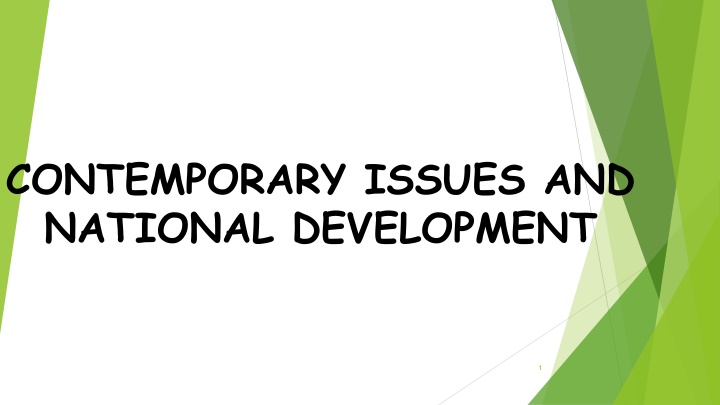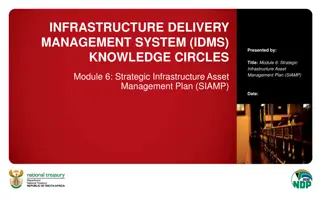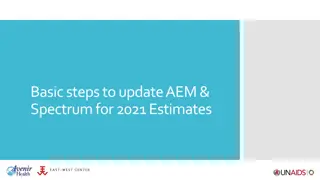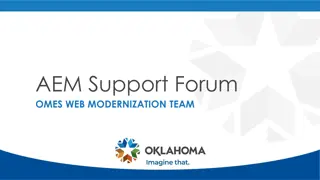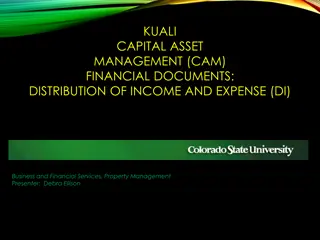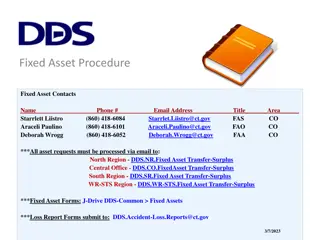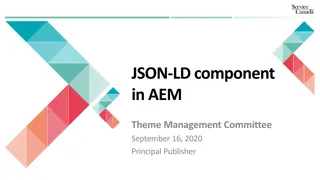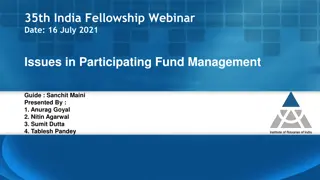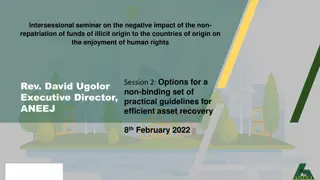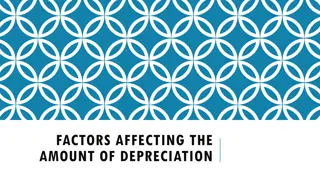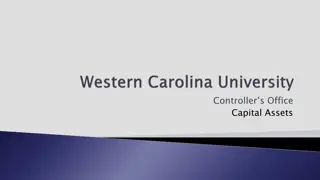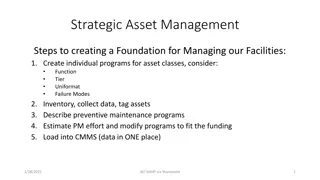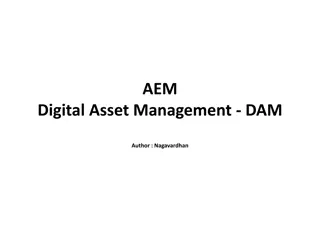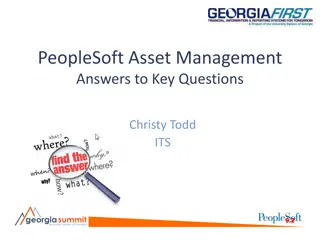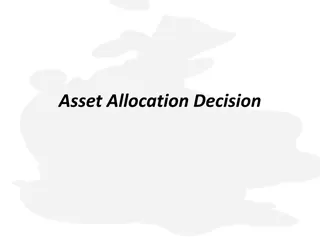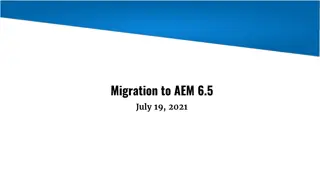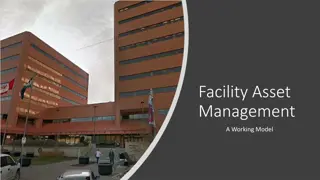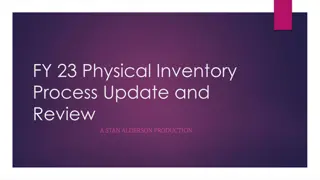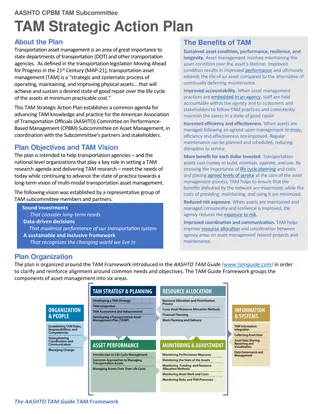AEM Digital Asset Management Overview
Digital Asset Management (DAM) on the AEM Platform enables effective management of digital assets like images, videos, documents, and audio clips. It offers features such as metadata support, asset grouping, annotations, metadata editing, image editing, workflows, and more. Explore the capabilities of DAM and streamline your asset management process efficiently."
Download Presentation

Please find below an Image/Link to download the presentation.
The content on the website is provided AS IS for your information and personal use only. It may not be sold, licensed, or shared on other websites without obtaining consent from the author.If you encounter any issues during the download, it is possible that the publisher has removed the file from their server.
You are allowed to download the files provided on this website for personal or commercial use, subject to the condition that they are used lawfully. All files are the property of their respective owners.
The content on the website is provided AS IS for your information and personal use only. It may not be sold, licensed, or shared on other websites without obtaining consent from the author.
E N D
Presentation Transcript
CONTEMPORARY ISSUES AND NATIONAL DEVELOPMENT 1
INTRODUCTION The purpose of governance as stated in the Constitution of Federal Republic of Nigeria is for provision of security and welfare to the people. Democratic governments from 1999 to date initiated programmes designed to improve the lives of Nigerians. National development refers to the ability of a nation to improve the lives of its citizens. Improvement in the lives of the people comes into play when there is increase in the Gross Domestic Product (GDP), literacy rate, health care, security, affordable and available housing and community development. The government conducts comprehensive studies on the needs of the citizenry and then draws a national development plan and policies to actualize them. 2
Introduction con.. The achievement of national development in any nation requires foresight, clarity of vision, firm decisions and commitment in implementing agreed projects and programmes. To address poverty and enhance meaningful living in Nigeria, government needs to rehabilitate, modernize and expand physical and social infrastructure in the country to meet the needs of the people. To this end, every government comes up with initiatives that define its focus and drive for the attainment of national development. These initiates include; SERVICOM, Monetization of Fringe Benefits, Zero Budgeting, Treasury Single Account, Bank Verification Number, Change Mantra and Anti Corruption Crusade. 3
AIM The aim of this paper is to have a critical look at contemporary issues and the impact they have on national development in Nigeria. 4
OBJECTIVES At the end of this paper participants should be able to; } Outline the functions of SERVICOM } Explain the concept of monetization of fringe benefits. } Define the term Zero Budgeting } State the operating principle of Treasury Single Account } Outline the benefits of Bank Verification Number } List the gains inherent in change mantra } Describe the anti corruption crusade of the Buhari Administration 5
SERVICOM Service Compact with all Nigerians (SERVICOM) is about service. The government of President Olusegun Obasanjo in June 2003 noted that public service is the only contact most people have with government. Ministries, Departments and Agencies (MDAs) are service windows through which the people access services provided by Government. If we hold that the primary purpose of Government is to improve the quality of life of citizens, Nigerians have legitimate expectation to be provided with good services without commercial motive more so that the services are funded by their taxes or common wealth. The MDAs have a social obligation to render quality services since they have no real competition and the citizen has no choice but to use government services. Regrettably, Nigerians have for too long been short-changed by the quality of public service delivery which is dependent on influences and inducements. These displays of corruption and inefficiency remain impediments to effective implementation of government policies. 6
Servicom The Nigerian Government has recognized that no reform process will be credible or sustainable without demonstrable service delivery. SERVICOM is a reform agenda of Government aimed at ensuring that MDAs offer services that meet the needs and expectations of the citizens and ultimately promote their standard of living. To achieve this, a document stating the work processes and procedures of each MDA was developed, which is called the SERVICE CHARTER. To drive the SERVICOM processes, three desks were created, namely Service Improvement, Customer Care and Charter Desk. The merger of the services of these desks projects the commitment of MDAs to achieving effective service delivery while giving the citizen the platform to demand service as a right, hence, the SERVICOM motto of YOU HAVE THE RIGHT TO BE SERVICED RIGHT 7
The objectives of SERVICOM are: Institute a framework for resolving and escalating all unresolved complaints, including obtaining feedbacks from the complainants . Learn the principles, ideals and tenets of Service Delivery in Government Establishme nts. Assist staff to take personal responsibilit y for customer satisfaction . Develop mechanism for collating all complaints, both internal and external. Assist the staff to understand the need for service excellence, and 8
The main functions of the SERVICOM office are: Co-ordinate the formulation and operation of SERVICOM charters and service improvement plans in MDAs Monitor and report progress and performance of MDAs under SERVICOM obligations through Compliance Evaluations using the SERVICOM index Carry out surveys of services and customers satisfaction, and Publicize charters and sensitize the citizenry to demand quality service as a right at all time. 9
The four main principles of SERVICOM are: Affirmation of commitment to the service of the Nigerian nation Conviction that Nigeria can only realize her full potential if citizens receive prompt and efficient services from the state Consideration for the needs and rights of all Nigerians to enjoy social and economic advancement, and Dedication to deliver services to which citizens are entitled, timely, fairly, honestly, effectively and transparently. 10
MONETIZATION OF FRINGE BENEFITS Evidence suggests that extrinsic rewards (e.g., money and promotion) and intrinsic rewards (which accrue from performing the task itself) are both important and cannot be directly substituted for each other (Beer and Walton, 1990:16). Employee in the public sector derives compensation for the services rendered. This is both direct (wages and salaries) and in indirect (fringe benefits) which motivate employees to strive for higher level of productivity. Total compensation is dependent on forces, such as, labour market factors, collective bargaining, government legislation, and top management philosophy regarding pay and benefits. However, available discussions indicate that organizations need to balance the elements between direct compensation and employee benefits if they are to effectively motivate employees and attain high performance levels (Schuler, 1996; Armstrong, 2003; Onasanya, 1999; Arthur, 1995; Cole, 2001 11
Monetization Of Fringe Benefits Thus a marked departure from the needed balance in the direction of either direct compensation or benefits can have major implications for motivation, job satisfaction and organizational performance. The Government of Nigeria considered monetization of employee benefits as a reform approach needed to address the corruption and padding of allowance that characterized the public sector. Monetization entails the conversion of employee benefits to cash payments, thus, a transformation of indirect compensation to direct. Monetization of employee benefits is the payment of money in lieu of the provision of the various forms of employee benefits accruable to an employee by his/her employer. 12
Benefits Of Monetization Include Employee have immediate increase in monetary wages/salaries that enable them to meet basic needs Employee experience strong motivational force that promote productivity It is a strategy that addresses low average wages. It favours the employer in the area of cost factor. Employee benefits are costly to maintain as wages and inflation increases. Monetization allows the employer to work on estimation on an annual basis, the amount of financial resources that need to be committed to the payment of the benefits and provide for the required amount in the budget. Enable the employer(Government) to reduce the level of fraud in the quantification and administration of benefits Reduces the potential for industrial disputes and negotiations Employer exercises control on employee benefits. 13
ZERO BUDGETING Budgeting is a proactive approach that allows Government or organization to put in focus its income and expenditure and making conscious decisions about how to allocate money in order to actualize set targets within a given period. The two main techniques of budgeting are: a. Incremental Budgeting; this involves taking last year s figure and adding a bit for inflation or whatever, or even taking a bit off due to perhaps down sizing b. Zero-Based Budgeting (ZBB) is a method of budgeting in which all expenses must be justified for each new period. In this approach of budgeting, every function within an organization is analyzed for its needs and costs. Advantages of Zero-Based Budgeting are: } Efficient allocation of resources as it is based on needs and benefits rather than history } Enable process owners to find cost effective ways to improve operations } Promotes staff motivation by providing greater initiative and responsibility in decision making } Detects inflated budgets. 14
Disadvantages of Zero-Based Budgeting. } This budgeting technique is a bias towards short-term planning } It is resource intensive. It takes more time and efforts to draw up a budget from scratch rather than modify an existing budget } Corrupt process owners can manipulate the process to provide more fund for themselves The Buhari led government took to Zero-Based Budgeting as a strategic step to achieve flexible budget, focused operations, lower costs and more disciplined execution in deliberate struggle to improve the standard of living of Nigerians. 15
TREASURY SINGLE ACCOUNT (TSA) Section 80 (1) of the 1999 Constitution as amended states All revenues, or other moneys raised or received by the Federation (not being revenues or other moneys payable under this Constitution or any Act of the National Assembly into any other public fund of the Federation established for a specific purpose) shall be paid into and form one Consolidated Revenue Fund of the Federation . This section of the constitution provides that all government revenues be remitted into a single account. This section was disregarded by successive governments who operated multiple accounts for the collection and spending of government revenue. In February,2015, the Central Bank of Nigeria issued a circular directing all deposit money banks to implement the Remita e-Collection Platform. The Remita e- Collection is a technology platform deployed by the Federal Government to support the collection and remittance of all government revenue to a Consolidated Account domiciled with the CBN. This marked the beginning of the full implementation of Treasury Single Account (TSA) system in Nigeria. Treasury Single Account is a public accounting system under which all government revenue, receipts and income are collected into one single account, usually maintained by the country s Central Bank and all payments done through this account as well. 16
THE PURPOSE OF TSA: Ensure accountability of government revenue Enhance transparency and avoid misapplication of public funds Ensure proper cash management by eliminating idle funds usually left with different commercial banks Enhance reconciliation of revenue collection and payment. 17
Operation of the TSA in Nigeria. The Central Bank has to open a Consolidated Revenue Account to receive all government revenue and effect payments through this account. This is the Treasury Single Account. All Ministries, Departments and Agencies (MDAs) are expected to remit their revenue collections to this account through the individual commercial banks who act as collection agents. This means that the money deposit banks will continue to maintain revenue collection accounts for MDA s but all monies collected by these banks will have to be remitted to the Consolidated Revenue Accounts with the CBN at the end of each banking day. In other words, MDA s accounts with money deposit banks must be zero at the end every banking day by a complete remittance to the TSA of all revenues collected. The implication is that banks will no longer have access to the float provided by the accounts they maintained for the MDA s. Different types of account could be maintained under a TSA arrangement for transaction purposes for funds flowing in and out. These accounts include; TSA main account, subsidiary or sub-accounts, transaction accounts, zero balance account, imprest accounts, transit accounts and correspondence accounts 18
Benefits of full implementation of TSA in Nigeria are: } Provides for proper monitoring of government receipts and expenditure. } Help to block most if not all the leakages that have been the bane of the growth of the economy. } MDAs are compelled to spend in line with duly approved budget provisions } Enable the Ministry of Finance monitor fund flow. } Government will have evidence based financial status of MDAs for policy formulation. TSA poses a challenge to Deposit Money Banks as public sector fund constitute major commercial bank deposit. However, the implementation of this financial policy though compliance to constitutional provision is a critical step towards curbing corruption in public finance. This is in line with the commitment of the current administration to combat corrupt practices, eliminate indiscipline in public finance and ensure adequate fund flow that will be channeled to critical sectors of the economy to enhance development. 19
BANK VERIFICATION NUMBER The use of technology has made bank transactions real time with improved service delivery. However, increased cases of compromise on conventional security systems (password and PIN) necessitated the demand for greater security for access to sensitive or personal information in the Banking System. Biometric technologies have been used to analyze human characteristics as an enhanced form of authentication for real-time security processes. Biometrics refers to identifying an individual based on physiological or behavioral attributes fingerprint, signature etc. The Central Bank of Nigeria through the Banker Committee and in collaboration with all banks in Nigeria on February 14, 2014 launched a centralized biometric identification system for the banking industry tagged Bank Verification Number (BVN). A unique ID number is issued to every Bank customer at enrolment and linked to every account that the customer has in ALL Nigerian Banks and ensuring that the customers Bank Accounts are protected from unauthorized persons. 20
The purpose of the BVN includes: Use biometric information as a means of first identifying and verifying all individuals that have account(s) in any Nigerian bank and consequently, as a means of authenticating customer s identity at point of transactions. To provide a uniform industrially accepted unique identity for Bank Customers To authenticate transactions without the use of cards using only biometric features and PIN Identification of blacklisted customers 21
The benefits of BVN are: Gives a unique identity that can be verified across the Nigeria Banking Industry Customers Bank Accounts are protected from unauthorized access It will address issues of identity theft, thus reduce exposure to fraud Enhance the Banking Industry chances of being able to fish out blacklisted customers Standardized efficiency of Banking operations thereby reducing queue in Banking halls Inter bank transactions are carried out with ease 22
CHANGE MANTRA According to Ochereome Nnanna, a political analyst, All over the democratic world, the change is a pet mantra employed by opposition parties. Continuity is the ruling party s counter to this battle cry. In this light, All Progressives Congress (APC) campaigned for change with the Presidential Aspirant assuring that he would fight corruption, provide security and diversify the economy. On the 29th of May, 2015 when General Buhari took oath of office, he stated that, I belong to everybody and I belong to nobody . Change transformed from a political slogan to a reform agenda of the Buhari administration. The change mantra as a reform agenda of the Buhari administration is aimed at delivering the dividends of democracy to the people through deployment of policies and programmes that will promote social justice and economic development. The sum of the measures and activities contained in the change mantra is to improve the standard of living of the citizens and to restore the image of the country to attract global respect and foreign investors. 23
The features in the change mantra include: } Respect for the rule of law } Commitment to national ideals } Diversification of the economy for revenue generation putting in view solid minerals , agriculture, tourism, etc } Putting in place solid structure for the achievement of the goals of Sustainable Development Goals(SDG) } Providing security ( Putting an end to terrorism in Nigeria) } Creating conducive environment for investment (Domestic and Foreign) } Addressing all issues bordering on corruption } Transparency and Accountability in the public sector } Zero-Based Budgeting } Reorganization of MDAs and review of allowances to cut down cost of administration } Building global partnership for development and the fight against terrorism. 24
ANTI-CORRUPTION CRUSADE Corruption in Nigeria has become an issue that has not only stunted development but attracted negative image for the country all over the world. This issue started to rear its head in the first republic. Since then, corruption, especially in public sector has progressively worsened such that the government of President Olusegun Obasanjo thought it wise to put in place structures to combat it. The thinking that informed this action was that corruption had become so invidious and strong that the Police could not fight. Hence, the birth of the Economic and Financial Crimes Commission (EFCC), Independent Corrupt Practices and other related offences Commission (ICPC), Bureau for Public Procurement (BPP), etc. 25
Anti-corruption Crusade With the exit of Obasanjo regime, the fight against corruption seem to have lost steam in the successive regimes that terminated on 29th May, 2015. President Buhari and All Progressives Congress (APC) thought the fight against corruption deserved to be in the front burner and hinged their campaign on it. President Buhari has been re-echoing that, if we don t kill corruption, corruption will kill Nigeria . Indeed, with the coming to power of Mr. President, the fight against corruption has gained momentum. On a daily basis, the underhand dealings of government functionaries in the past regimes come to light. First was the 2.1 billion dollars arms procurement deal popularly known as Dansukigate, then the NIMASA case, the trial of the number three citizen, Dr Bukola Saraki, the President of the Nigerian senate, the reopening of the Halliburton and Siemens bribery cases, termination of senior public officers for abuse of office, etc. 26
The benefits of this crusade include; } Restoring public confidence in governance } Recovery of looted funds } Instilling fiscal discipline in the country thereby checking diversion and misapplication of government resources } Stimulating economic growth } Helping to create employment and social security } Promoting quality service delivery as inducement and influences would not be involved in accessing services } Attracts foreign investors 27
CHALLENGES IN ACHIEVING NATIONAL DEVELOPMENT Some of the challenges in achieving national development include; } Poor planning and ambiguous implementation framework for developed policies } Inadequate funding of activities and projects relevant for the actualization of the reform agenda } Absence of buy-in of the citizens as shown during the BVN registration. } Poor understanding of the scope and needs of the reforms by process owners making them unprepared for the implementation of the reform initiatives } Apathy on the part of Public officers who perceive the reforms as unfavourable to their personal interests } Ethno-religious factor which influences the response of the citizens to the policies and programmes of government. } Effect of political differences on implementation of reform agenda. 28
THE WAY FORWARD A nation striving to achieve National Development must take proactive steps that would enable it to effectively implement its programmes targeted at promoting the living standard of the citizenry. These steps include; } The government should draw appropriate implementation framework for its reform initiative for clarity and ease of take off and sustainability. } Adequate budgetary provision is required for the success of any reform agenda. } There is need for all inclusive sensitization on reform initiatives to stimulate the participation and buy-in of the citizens } Issues of capacity gap imposing limitation in conduct of government business as observed during the implementation of TSA should be addressed through robust training } There is need for improved monitoring of the implementation of government programmes and appropriate sanctions applied to align all efforts to set rules and standards } Political difference should be managed in such a manner that opposition parties would in national interest support and drive the implementation of government programmes. 29
CONCLUSION The government has the mandate to provide security and welfare to its citizens. The citizens depend on MDAs to deliver services that will promote living standards. Government puts policy and programmes in place to ensure that services sought by the citizens are delivered satisfactorily. Effective implementation of these programmes accounts for National Development. The country under President Mohammadu Buhari is witnessing a lot of reforms and actions strategically injected to address corruption, secure commitment to safe financial transactions, check insecurity, uphold social justice and promote economic growth. 30
REFERENCES: 1. Adeolu I. A (2015). Understanding the Treasury Single Account (TSA) System-Things you should know. Business and Economy, Market Development. 2. CBN (2015). Revised Guidelines for Compliance with Treasury Single Account by Banks in Nigeria. 3. Mustapha Muktar (2014). Monetization of Fringe Benefits in Nigeria Public Sector: Which way 4. Pere Ayapere (2010). The Effect of Monetization on Federal Civil Servants in Nigeria. Public Personal Management Paper 5. Ogunrin F.O & Erhijakpor (2009). SERVICOM Policy Intervention: Improving Service Quality in Nigeria Public Sector. Global Journal of Social Science Vol. 8 No.1 31
